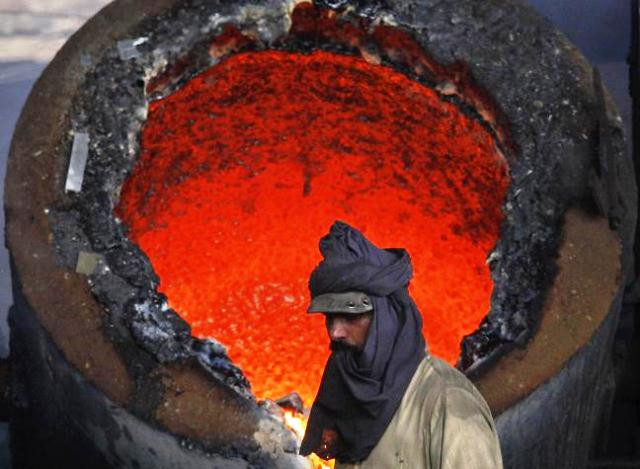On Friday, 11 bonded labourers were freed from a brick kiln in the outskirts of Islamabad. They had been crowded into squalid pens and were forced to live in inhuman conditions which earned them a princely sum of Rs 300 per week. That’s Rs43 per day. That’s less than many of us spend to get to work. That’s less than the price of a plate of daal chawal. That’s less than a human being needs to survive.
Slavery is abhorable, but in Pakistan, it is also an unavoidable fact of life.
Or is it?
How often do you hear anyone praising slavery? How often do you hear someone refer to their domestic help as their assets? How often do you hear industrialists and entrepreneurs refer to their employees as their private property?
The answer (hopefully) is never.
Yet, almost everyone reading this has, in some way, shape or form, benefitted from slavery. Be it the house you live in, the food you eat, the children you employ, or the red light pleasures some of you may enjoy, chances are there was slave labour input in the final product.
If it sounds unbelievable, just try replacing the word “slavery” with the term “bonded labour”, a term people in Pakistan are more familiar with. Bonded labour and slavery are essentially synonymous. Both involve forced labour ‘motivated’ by the very real threat of violence.
The only real change in slavery from days past is the fact that today ownership is not a necessity to exploit people in slave-like conditions.
Apart from the much maligned brick kilns, globally, industries like sweatshops (mostly garments and shoes), agriculture, and prostitution rely on contemporary slavery.
In the book Disposable People: New Slavery in the Global Economy, Kevin Bales described how the living conditions of African slaves in the US were actually ‘better’ than those for modern slaves, namely because of ownership. As a tradable commodity, slaves in the US were treated as long-term investments, because of which, even though many basic human rights abuses did occur, killing them, torturing them or starving them was not in the owner’s best interest. A ‘broken’ slave, like broken car, has no resale value, and can’t just be disposed off because slavery was legal there at the time, and slaves did have a right to life, if not liberty and the pursuit of happiness.
Bales also wrote, “It surprises people that there’s actually a very large number of slaves in the world today -- our best estimate is 27 million. And that is defining a slave in a very narrow way; we’re not talking about sweatshop workers or people who are just poor, we’re talking about people who are controlled by violence, who cannot walk away, who are being held against their will, who are being paid nothing.”
Today, because slavery is illegal, it is easier to treat slaves as short term holdings that can be destroyed on a whim. Widespread poverty makes them easily replaceable, while poor policing actually facilitates acquiring or replacing them.
But there is a solution: enforce existing laws, and where necessary improve upon them. The actions of the Supreme Court regarding the case in Islamabad are commendable, but the fact that the highest court in the land needed to intervene to set these people free is not.
That, dear readers, is simply an embarrassment.
Why can’t our law enforcement agencies enforce one of the most basic constitutional rights? If the police had been doing their jobs, the Supreme Court wouldn’t have even needed to get involved, because the sadistic beings running the kiln would be locked up in a little room.
Only they would deserve it.
As a postscript, for those who think the problem is exaggerated and debt bondage is of one’s own doing (never mind that extortion is both illegal and Haraam), I can only present one argument in defence:
Whenever I hear anyone arguing for slavery, I feel a strong impulse to see it tried on him personally.
Abraham Lincoln
"The essence of all slavery consists in taking the product of another’s labour by force. It is immaterial whether this force be founded upon ownership of the slave or ownership of the money that he must get to live"
Leo Tolstoy
What the Constitution says
Slavery is non-existent and forbidden and no law shall permit or facilitate its introduction into Pakistan in any form.
All forms of forced labour and traffic in human beings are prohibited.
No child below the age of fourteen years shall be engaged in any factory or mine or any other hazardous employment.
Nothing in this Article shall be deemed to affect compulsory service:-
(a) by any person undergoing punishment for an offence against any law; or
(b) required by any law for public purpose provided that no compulsory service shall be of a cruel nature or incompatible with human dignity.
The Constitution of Pakistan, Part II, Chapter I, Article 11
Published in The Express Tribune, August 21st, 2011.


COMMENTS
Comments are moderated and generally will be posted if they are on-topic and not abusive.
For more information, please see our Comments FAQ